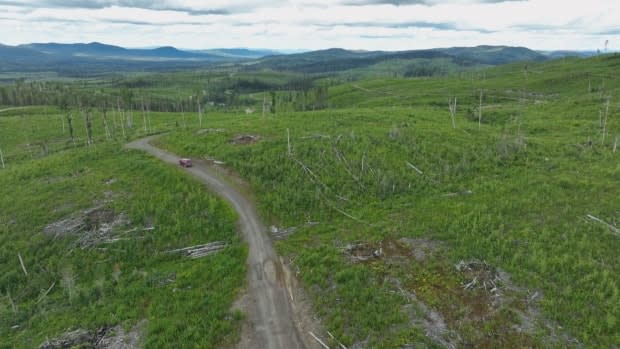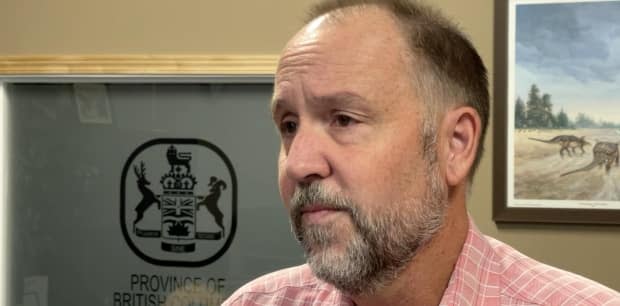Canfor shuts down operations in Chetwynd and Houston, B.C., affecting 490 jobs

Canfor has announced the permanent closure of its Chetwynd, B.C. operations, as well as a temporary closure of its Houston sawmill, creating further challenges for forestry industry workers.
The company said shutting its Chetwynd sawmill and pellet plant is part of what it calls a restructuring of operations in the province, while the temporary closure of its sawmill in Houston, meanwhile, is part of a restructuring focused on manufacturing.
The company said up to 490 employees would be affected but did not provide an exact number of how many jobs would be lost.
However, the union representing workers at both locations estimated at least 400 people would be out of work.
"My phone hasn't stopped ringing," said Jeff Bromley, chair of the United Steelworkers Wood Council.
"[There's] lots of heartache, lots of confusion."
In an email to CBC News, Canfor said its plants in Chetwynd employ 157 people, adding that "where possible, employees will be prioritized for hiring and redeployment to other Canfor locations."
For Houston, it said "it is too early in the project planning to fully understand how many of the 333 employees who work at that facility will be laid off."
Canfor said it is hoping to keep as many people as possible employed through other projects.
Bromley, though, noted the small size and remote locations of the communities would make it difficult for laid-off workers to stick around.
Houston is about 300 kilometers west of Prince George, while Chetwynd is about 300 kilometres northeast of the city and 100 kilometers east of Dawson Creek. Both are home to just over 3,000 people.
"It's not easy to just sell your house and find other work," Bromley said.
"It's a major, major impact on small communities."
Dwindling fibre supply
The announcement comes two weeks after Canfor announced the loss of 300 jobs as it phases out one of its Prince George pulp lines.
In all cases, the company blamed dwindling long-term fibre supply for the changes as the amount of accessible timber available for harvest declines.
"We are making these difficult but necessary decisions to create a more sustainable operating footprint in B.C.," president Don Kayne said in a written statement.
"Our goal is to match our mill capacity with the economically available fibre for harvest to enhance our ability to compete and to operate throughout the market cycles."

Canfor says it will wind down both Chetwynd and Houston operations sometime this spring, removing approximately 750 million board feet of annual production capacity.
Afterward, it says it will begin redeveloping its Houston site to become "a globally competitive manufacturing facility," aimed at producing "high value products from the sustainable timber supply in the region."
However, Bromley warned that would likely be a two-year process and result in fewer jobs than before.
Industry-wide challenges
Liberal MLA Mike Bernier, whose Peace River South riding includes Chetwnyd, said in a Facebook post he'd been told Canfor was unable to get guaranteed certainty on fibre supply, leading to its decision to close the plants.
"It's hard to make any decisions to stay open when you can't access wood anymore," he wrote.
The reduced supply have been blamed on a number of factors, including fallout from the mountain pine beetle, forest fires and forestry management practices by companies focused on short-term profitability over long-term sustainability.

Canfor isn't alone in downsizing operations as a result: earlier this week, both Tolko Industries and Sinclair Forest Products announced further curtailments at operations throughout B.C.'s Interior and north, impacting more than 700 employees.
In response, the province announced several supports for the industry, including a $90-million manufacturing jobs fund, $50 million to access hard-to-reach fibre in fire-damaged regions, and a $4.5-million investment to help re-open a Vancouver Island pulp and paper mill.
After Canfor's announcement, forests minister Bruce Ralston and jobs minister Brenda Bailey issued a joint release saying community support teams have been deployed to provide resources and services to help impacted workers following the job cuts.
They also expressed support for Canfor's plans in Houston, saying the addition of a manufacturing plant will ensure "good forestry jobs remain in the region" in alignment with their overall strategy of creating more value-added jobs.
But while that might be a silver lining on the horizon, Bromley said for now, workers across the industry are worried about their jobs being on the line.
"I fear now there's more [cuts] to happen," he said. "We just don't know where or when.
"The uncertainty is palpable."


